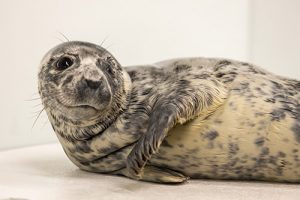
OCEAN CITY — A grey seal pup rescued from the beach in neighboring Delaware is on the mend at the National Aquarium and could soon be released back into the wild.
On Feb. 12, a grey seal pup now known affectionately as Eloise, in keeping with the National Aquarium’s theme this year of naming rescued marine mammals after famous storybook characters, was recovered from the beach in nearby Cape Henlopen. Eloise was initially triaged at the Marine Education Research and Rehabilitation Institute (MERR) and was transported to the National Aquarium’s Animal Care and Rescue Center on Feb. 14 for rehabilitation.
Animal Care and Rescue Center staff determined Eloise was malnourished with a few lacerations on her neck. Eloise was initially hydrated and nourished through an oral feeding tube, but has since progressed to the next stage of her rehabilitation. Due to the seal’s young age, she is still considered a maternally-dependent pup, meaning if she was still in her natural habitat, she would be relying on her mother for milk.
For that reason, Eloise’s rehabilitation thus far has focused on teaching her how to eat fish, a skill she would normally learn from her mother. Despite the challenges of being a maternally-dependent pup, Eloise is currently exceeding far exceeding expectations by eating fish on her own. She also has full-time pool access for swimming and other enrichment activities as Animal Health and Rescue teams prepare her for an eventual release back into the sea.
The National Aquarium’s Animal Health and Rescue team has limited experience in rehabilitating a seal pup. Last year, the team rehabilitated its first maternally-dependent pup named Pippi Longstocking, in keeping with the theme. Pippi Longstocking was rescued from the beach in Delaware and rehabilitated at the aquarium before being released back into the wild on Assateague Island. The young seal had to have surgery to remove her ear canal and a portion of her ear’s bony structure.
“Pippi and Eloise are unique cases for the mid-Atlantic because they have stranded when they are still young enough to be maternally-dependent,” said National Aquarium Animal Rescue Director Jennifer Dittmar. “There could have been many reasons for this happening, including storms, a possible human interaction that scared off the mom, maternal instincts that haven’t kicked in or birthing complications.”
Eloise currently weighs just 28 pounds. She will need to at least double her weight before she is eligible to be released.

